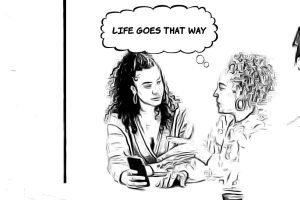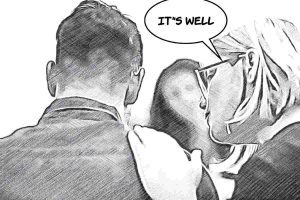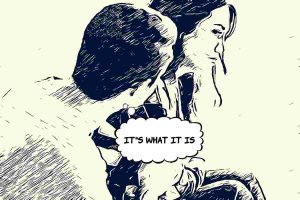One interesting thing about language is that it’s easily loved and admired by non-native people. The French language is a typical example.
One of the very old and popular French sayings is “c’est la vie.” This expression is very common, even outside France. People have found a way to infuse it into music, movies, and their daily conversations.
What’s interesting is that the English have taken a keen interest in this expression. However, the French have many other ways to express the meaning of this phrase.
If you want to find out about the meaning of c’est la vie and how to use it in sentences, keep reading this article.
Also, you’ll know whether this expression is negative or positive, and other alternative phrases you can use.
What Does C’est La Vie Mean in English?
“C’est la vie” is a French idiomatic expression that means, “that is life” or “such is life.” It’s a phrase you can use as a single sentence or as part of a sentence to express your sadness about something.
It’s a natural expression that people lament when faced with an unfavorable situation they must accept.
Also, in France, it’s used as a reminder that there’s nothing much you can do about what life gives you. People use this expression resignedly when they can’t do anything about a situation.
For instance, when you go for a job interview and you’re not picked. You can use this expression to describe and accept your fate.
However, while this expression is usually used in a negative situation, you can also use it in a light situation or normal conversation.
For example, you can use it to describe a lifestyle. For example, “Étudier 24h/24, c’est la vie d’étudiant” means “studying 24 hours a day is student life.”
Also, you can use this expression to describe a passion or love for something. An example is, “la cuisine c’est la vie”, which means “cooking is life.”
Below are some other ways to use this expression:
- Nous échouons parfois; c’est la vie – we fail sometimes; that is life
- C’est triste que le pasteur ait perdu son fils, mais c’est la vie- sadly, the pastor lost his son, but that is life
- Se lever tôt, c’est la vie d’un travailleur- waking up early is the life of a worker
Is C’est La Vie Positive or Negative?
“C’est la vie” as an expression is neither negative nor positive. It’s just a phrase you use in a negative situation, as a plain conversation or to describe a passion or lifestyle.
So, whether it’s positive or negative depends on the context of the conversation or statement.
You can describe it as negative when you’re resigning yourself to a bad situation you can’t help.
Here’s an example:
- A- I did my best at the audition but I wasn’t chosen
- B- you tried, but that is life- tu as vraiment essayé, mais c’est la vie
However, you can describe it as positive when you’re describing a passion.
Here’s an example:
- Painting is life to me- La peinture c’est la vie pour moi
15 Synonyms of C’est La Vie
There are various expressions you can use as an alternative to “c’est la vie.” They include, “That’s how it is,” “Oh well,” and
“that’s the way it is.”
Here are 15 synonyms for “c’est la vie”
- That’s the way it is- C’est comme ça
- That’s simply how it is- C’est tout simplement comme ça
- Oh well- tant pis
- Life goes that way – ainsi va la vie.
- What can I do!?- que voulez-vous!
- What will be will be que sera sera
- That’s the reality- c’est la réalité
- It’s one of those things- c’est une de ces choses
- These things happen- ces choses arrivent
- There’s a reason for everything- Il y a une raison à tout
- We can’t question life- nous ne pouvons pas remettre en question la vie
- It’s well- c’est bien
- You get this sometimes- tu comprends ça parfois
- It’s what it is- c’est ce que c’est
- There’s nothing we can do-Nous ne pouvons rien faire
That’s the Way It Is- C’est comme ça
“That’s the way it is” is a good synonym for “c’est la vie.” It’s an expression you use when you accept something that has happened because you can’t change it.
Here’s how to use the expression:
- There’s nothing we can do. That is the way it is
- That’s the way it is. I keep telling you
That’s Simply How It Is- C’est tout simplement comme ça
“That’s simply how it is” is another statement you use resignedly when you can’t change something that has happened to you.
Here’s how to use it:
- I’ve told her not to bother talking about it. That is simply how things are here
- That’s simply how things are done here. Quit whining
Oh Well- Tant pis
“Oh well” is an expression that shows you’ve accepted something the way it is.
Here’s an example:
- Oh well, what can we do?
- Oh well. We go again next time
Life Goes That Way – Ainsi va la vie

“Life goes that way” is another statement that shows acceptance of fate.
Here’s an example:
- Sadly, life goes that way. We can’t do much
- Life goes that way. You’ve got to understand that
What Can I Do!?- Que voulez-vous!
“Que voulez-vous!” as a question means “What do you want?” But, you can use this statement as an exclamation, which means “What can I do!?”
“What can I do!?” is an interjection you use when you’ve no control over a circumstance.
Here’s an example:
- What can we do? Let’s believe it’s destiny
- I failed the exams, but what can I do!?
What Will Be Will Be- Que sera sera
“What will be will be” is another statement that indicates you’ve accepted fate.
Here’s an example:
- What will be will be. There’s no helping it
- What will be will be. That’s the truth
That’s the Reality- C’est la réalité
Another statement that shows you’ve taken whatever happened to you in good faith is “That’s the reality.”
Here’s an example:
- We will all die one day, that’s the reality
- We’ll all face disappointment someday, that’s the reality
It’s One of Those Things- C’est une de ces choses
“It’s one of those things” is another expression that you say when you’ve taken things as they are.
- I was sad he didn’t call me, but it’s one of those things.
- Don’t feel bad you weren’t picked. It’s one of those things
These Things Happen- Ces choses arrivent
“These things happen” works like the above to show that you’ve accepted something that has happened to you.
Here’s an example:
- I’m so sorry for what happened. These things happen
- Take heart, okay? These things happen
There’s a Reason for Everything- Il y a une raison à tout
“There’s a reason for everything” is a common expression people use when unfortunate things happen to others to make them feel less sad.
Here’s an example:
- Don’t take it hard on yourself. There’s a reason for everything
- There’s a reason for everything. Just take this as good faith
We Can’t Question Life- nous ne pouvons pas remettre en question la vie
“We can’t question life” is another thing you say when you’ve accepted something that you can’t change.
Here’s an example:
- I’ve come to understand that we can’t question life.
- We can’t question life and what it gives us
It’s Well- C’est bien

“It’s well” is another common phrase that shows you’ve accepted whatever happens to you.
- It’s well. I have moved on.
- I heard Susan lost a baby. Mmmh, It’s well.
You Get This Sometimes- tu comprends ça parfois
“You get this sometimes” is another thing you say when things you’ve no control over happen to you or the people around you.
Here’s an example:
- It’s alright. You get this sometimes
- I’m not sad, I know we get this sometimes
It’s What It Is- c’est ce que c’est

“It’s what it is” is another exclamation that shows you have accepted something that you’ve no control of.
Here’s an example:
- It’s what it is. We’ll do better next time
- I’m glad we got the opportunity to participate even though we didn’t win. It’s what it is!
There’s Nothing We Can Do- nous ne pouvons rien faire
“There’s nothing we can do” shows you’ve accepted a situation because you can’t help it.
Here’s an example:
- There’s nothing we can do. Let’s just move on already
- There’s nothing you can do about it. Let peace reign, please
Wrapping Up
“C’est la vie” is a popular French idiom that expresses your acceptance of a situation, usually because you can’t help it.
It translates to “that’s life” or “such is life.” However, you can’t use it only in a negative situation. You can also use it to describe a passion or to describe a lifestyle.